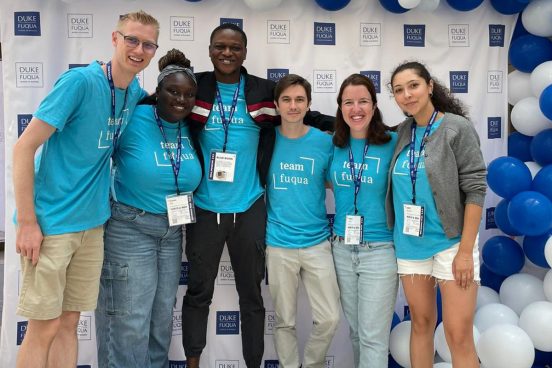Duke Daytime MBA Student Blog

A Study in Life
Independent Study has Unexpected Impact
Ask any second-year student why they’re glad they came to Fuqua, and unless you make the mistake of asking during finals or final presentations, most of them will probably note that we have professors who are both venerated in their fields and deeply impassioned about Fuqua. It’s no surprise that most students feel like they get a richer learning experience than they might have elsewhere.
So what happens when the professor is no longer the professor? This semester, I was lucky enough to develop my own independent study. I tasked myself, with Fuqua’s approval, to write a case study based on my pre-Fuqua experiences as a consultant. I enjoy writing (hence my participation in this blog) and enjoy case studies as a teaching method (hence my attendance of business school), so I figured that, with the proper direction from my sponsor, this would be a rewarding experience.
It was, of course, but it turns out that the same liberty and flexibility of an independent study that appeal to students constitute the bulk of the challenge. The objectives of a regular course tend to be made pretty clear early on, and there are a finite number of assignments, each conceived and evaluated by someone with many years of training in how to teach. As far as I was concerned, I was trying to hit a moving target, one that I was to paint myself. It was a daunting challenge, and that was before I even got into the research.
My life has always been predicated on having some objective manner of measuring success. Every job I’ve had, every class I’ve taken, every game I’ve played has been subject to some external scrutiny, some quantitative method of determining whether I did my job. I suppose this is a convenient shorthand way of making choices in life. We’re hardwired to accept outcomes when they’re predicated on numbers, even if we don’t agree with them, because they seem fair.
Was this independent study, then, an inflection point for me? Undoubtedly, I would receive a grade for this study, but atypically, based on criteria I set for myself. And even that would be subordinate to the intrinsic feeling of success or failure that came out of it. I got to thinking that this might have been an unintentional allegory for the years that lay ahead. Everyone who comes out of Fuqua should be highly functional in their chosen field, so functional, in fact, that they’ll probably progress faster than many of their peers. And, as that happens, the criteria for success will shift; as our graduates move toward the higher ranks of their firms, they’ll begin setting the bars by which they, and their organizations, will be measured. Most of the time, there isn’t a good template by which to make such decisions, no hard and fast way to ascertain progress. Hopefully, at times like these, we’ll be glad that we’ve had a wealth of experience, both academically and professionally, to guide us.
So, as my work on this case progressed, it took on a new meaning. I thought I had undertaken it because it played to the strengths on which I had built my career to this point, but in fact, it was also a way of forecasting some of the dilemmas I may face going forward. Perhaps the case wasn’t as much about an investment scenario, as I had planned, but rather about the transition that takes place in business school.



